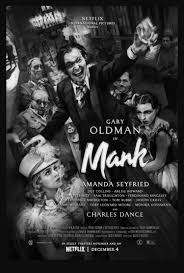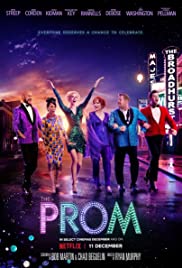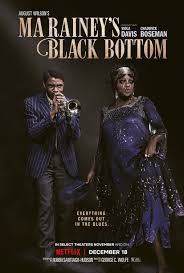Movie Review Roundup: Netflix’s Mank, The Prom, & Ma Rainey’s Black Bottom
December 22, 2020
With the film industry’s future quickly shifting, many moviegoers are now looking towards streaming to experience new, hot button projects. Netflix’s traction in the last few months has skyrocketed more than it ever has, so much so that its relevance in the realm of awards season keeps on growing. Plenty of performers and filmmakers are being recognized on the small screen just as well as many household favorites that appeared in theaters.
December, the home stretch of this oddly poetic year, has provided plenty of new movies. And with the release of any new film, the potential for enriched conversation is always there. Here is a look at this month’s latest Netflix endeavors:

Mank
★★1/2
The most recent from acclaimed director David Fincher (The Social Network, Fight Club, Gone Girl), Mank follows alcoholic screenwriter Herman Mankiewicz (Gary Oldman) as he slowly, but assuredly, tries to finish writing the script for the beloved classic, Citizen Kane.
One of Fincher’s most notable characteristics as a director is his keen eye for visual storytelling. Looking back on some of his most beloved works, Fight Club has a very distinctive, grimy look to it that, once noticed, is indisputably associated with Fincher’s creative fingerprints. His films are dynamically shot, taking advantage of shadows in frame, and he loves to suck the audience into whatever he’s presenting.
Which is why it’s a shame that Mank keeps its audience at a cold arm’s distance on an emotional level throughout a lot of its runtime.
The look and technicalities are definitely there, but weirdly enough, it doesn’t really feel like a film directed by David Fincher. The film is dedicated to capturing the feel and essence of a rudimentary film released in the 1940s, but it makes the whole ordeal feel significantly less Fincher. Gary Oldman showed up to work, some scenes his portrayal of the titular role is very motivated, others not so much. The real MVP of the movie, however, is Amanda Seyfried’s spotless portrayal of actress Marion Davies; her potential to get the golden statue come Oscars night is rather palpable. She’s that committed and memorable here.
All while Oldman’s Mank is trying to complete the Citizen Kane screenplay and get writing credit, the film jumps back and forth in period, dedicating time to Mank’s beliefs surrounding the Californian election with Upton Sinclair. At first, the screenplay framework endeared me, but as the film progressed, the fragmented approach didn’t quite work to its overall benefit, rendering large sections of the film unfocused.
Mank is a frustrating case of a movie that has a lot on its mind, and thinks it’s tackling it all successfully, when it actually never really provides the audience with an emotive, anchored perspective. It’s a merely okay endeavor, and coming from the man who made The Social Network, Fight Club, Zodiac, Gone Girl, Se7en, and plenty more…that can’t help but feel a bit disappointing.

The Prom
★
If The Prom was a person you saw out in public during these bizarre times, you’d be best to wear your face mask so you don’t get fatally ill from its putrid buffoonery.
An excruciating, overlong musical helmed by Ryan Murphy, this centers around a group of snooty, obnoxious Broadway stars (Meryl Streep, James Corden, Nicole Kidman et al) that are alerted by a high school that cancels their prom because one of their gay students, Emma (Jo Ellen Pellman), wanted to take her girlfriend that night. This gives the stars motive to go to that high school and insist the prom resumes in order to boost their egos. That may be a harsh synopsis, but this is a miserable experience of a movie.
I can’t really speak to the quality of this as an adaptation (the material originally comes from a stage musical), but I sure can express its quality otherwise! Every creative decision feels wrong and misguided. Every scene looks like the inside of a gumball machine, full of clashing colors and unneeded sweetness. Nearly every member of the cast is insufferable; the only one that kind of gets away free of sins is Nicole Kidman (because it’s Nicole Kidman). Do not even get me started on James Corden and his heightened, loud antics!
Musicals are wonderful! They can make people feel elated, inspired, musically inclined, so many superlatives. This? A complete wash! Every song feels like it goes out of its way to be the antithesis of sophistication. Lyrically lame and shoddily staged, every musical number is a chore to sit through. The biggest problem, however, is how it tries to celebrate the LGBTQ+ community. Its focal gay character is exactly that: a focal gay character. She’s only really defined by her orientation, and has little to no other traits beyond that. It’s insulting that plenty of Hollywood fare thinks that a character being gay is merely enough to making them instantly embraced as a well rounded presence. It’s efforts to celebrate the prideful feel like nothing less of a mockery, and the ending (no spoilers) proves that more than anything.
This film made my stomach churn from secondhand embarrassment. It made the hairs on my neck raise, not from goosebumps or excitement, but because I legitimately felt like my lunch was going to end up in the toilet at a moment’s notice. Everyone involved needs to rethink their life choices. Please avoid, and skip the matinee for this one.

Ma Rainey’s Black Bottom
★★★★
The newest and best of this selection, Ma Rainey’s Black Bottom is the story of singer Ma Rainey (glorious performance from Viola Davis) in the late 1920s, and the recording of some of her music with her backup band players. One of these players, Levee (played by the late great legend and the king of Wakanda himself, Chadwick Boseman) holds a lot of lofty ambitions about his own music, and he also carries plenty of emotional baggage that unravels as the story progresses.
Every actor delivers, and in many ways, they elevate what could be some potentially melodramatic material into something that feels raw and earned. The conversational stretches that exist between the band members with each of them bouncing off of each other could have gone on even longer, and it would have been wonderful.
Boseman has a monologue at around the midpoint that is one of the most devastating and committed scenes of the year. Levee just aches with sorrow and resentment, and it pierces the heart like very little provided in recent memory. And despite possessing its necessary, heavier segments, there are still plenty of laughs to be had. Ma Rainey’s insistence on drinking a full bottle of Coca-Cola before a recording in particular delighted me insanely.
Even as a movie adapted from a stage play, it still manages to appear nicely cinematic and pleasing to look at. The camera gently swirls around its actors, who are respectively filling up each bit of the frame with their star studded work, and the dusty interior of the recording studio feels tangible and lived-in. If there are any flaws, the film is rather tight, clocking in at roughly 90 minutes, when it could have definitely been longer and added some additional dimension to some of the other supporting characters. Some breathing room in between big moments for them to ponder could have been really impactful.
Nonetheless, this stands as one of Netflix’s better ventures in awhile, and it deserves everyone’s attention at the moment. An absolute stunner with plenty of stars to go around.

